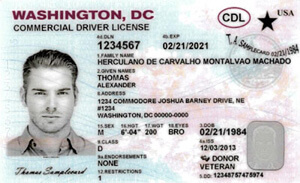- Updated for March 2025
- Based on 2025 DC commercial driver's license manual
Free District of Columbia CDL Permit Practice Test: General Knowledge 2025
Washington, D.C., with an area of just 68 square miles, has a gross domestic product (GDP) of $99 billion per year. That’s more than states 2,100 times its size. Such a large GDP would be completely impossible without commercial drivers to move goods and products in and out of the district -- which is where you come in. You will soon receive or renew your commercial driver license (CDL), and this practice quiz will help make that possible by giving you realistic practice for the CDL written exam. These 50 multiple-choice questions cover crucial information from the Washington, D.C. Commercial Driver License Manual, as well as federal and local laws. You’ll be tested on right-of-way rules, braking and shifting techniques, driving in special weather and road conditions, handling emergency situations, and more. Use the hint provided with each question, and read the explanations carefully to ensure that you’ll be able to answer future questions correctly. Come back and keep practicing until you feel comfortable with the information. Good luck on your CDL exams!
FAQs
How can you obtain yours?
To obtain a CDL license in the District of Columbia, first acquire a commercial learner’s permit (CLP) by passing the required knowledge tests. Hold the CLP for at least 14 days before taking the skills test. Then, complete CDL training (recommended) and pass the skills test. Ensure you meet all age and medical requirements.
What is the associated cost?
The cost for a CDL in the District of Columbia includes a $78 fee for the CDL, a $10 fee for the knowledge test, and a $10 fee for the CLP. Additional fees may apply for skills testing and medical examinations.
How many questions are on the official test?
The CDL permit test in the District of Columbia typically consists of 30 to 50 questions, depending on the class of CDL and endorsements. You need to score at least 80% to pass.
What is the minimum age required?
You must be at least 21 years old to obtain a CDL in the District of Columbia for interstate transportation or to transport hazardous materials. For intrastate transportation, the minimum age is 18.
- Perfect for first-time and renewal CDL/CLP applicants, and those adding endorsements
- Triple-checked for accuracy
What you need to know

What to expect on the actual DC DMV exam
questions
correct answers to pass
passing score
List of questions (classic view)
- Which of the following must you present when applying for your District of Columbia CDL?
- What is the most important hand signal that you and a helper should agree on?
- In which of the following two conditions should you downshift?
- Starting the engine and inspecting the cab involves each of the following tasks, EXCEPT
- If you double your speed, how much more distance will it take to stop?
- What might happen if you swing wide to the left before you turn right?
- It has just reached freezing. Which of the following area(s) may be slippery?
- What is the gross vehicle weight (GVW)?
- Before transporting a sealed load, you must check
- Which of these is NOT part of the basic method of shifting up?
- Which of the following factors can influence the safe speed for going down a steep downgrade?
- For how long will you lose your CDL driving privileges if you are convicted of a second DUI offense?
- You don't want to be a distracted driver, so you
- What will help a drunk sober up?
- How many tiedowns are required for a 20-foot load?
- Hazardous materials placards are
- Why should you cover cargo?
- If the engine is not overheated, is it completely safe to remove the radiator cap?
- You should put the starter switch key into your pocket while you perform the pre-trip inspection because
- Tire fires are commonly caused by
- What is the best way to figure out how many seconds of following distance you have?
- An anti-lock braking system (ABS) will
- What is the definition of a hazard?
- If you are traveling at 55 mph in a 30-foot vehicle, you should leave ___ seconds of following distance.
- The minimum tire tread depth for front tires is
- Total stopping distance equals
- Which of the following statements about retarders are correct?
- To transport cargo safely, which of these are you NOT responsible for?
- While driving at night, which lights should you use as often as you can?
- Always try to back toward the driver's side because
- You should inspect wheel bearing seals for
- To help you stay alert and safe while driving, you should
- How can you start moving without rolling backward?
- How can you determine if your vehicle is equipped with an anti-lock braking system (ABS)?
- What can you do at an accident scene to help prevent another accident?
- While you are on the road, how often must you stop to check your cargo?
- Letting the air out of hot tires
- Which of the following should you NOT do if you experience a tire failure?
- During your pre-trip test, when examining hoses with the instructor, you need to look for
- If you are confronted by an aggressive driver, you should
- Which of the following should you NOT check during a trip?
- On wet roads, you should reduce your speed by
- Which of the following is a key steering component?
- When backing, it is important to use a helper
- How long does it take for a typical tractor-trailer to clear a double railroad track?
- On which of the following types of fires should you NOT use a B:C fire extinguisher?
- How many hours of sleep per night does the average person need to avoid accumulating sleep debt?
- Do empty trucks have the best braking?
- Where should you place your warning devices if you must stop on a one-way road or divided highway?
- Which is NOT one of the four basic skills that the safe operation of a commercial vehicle requires?
- Alabama: Test 1 / Test 2
- Alaska: Test 1 / Test 2
- Arizona: Test 1 / Test 2
- Arkansas: Test 1 / Test 2
- California: Test 1 / Test 2
- Colorado: Test 1 / Test 2
- Connecticut: Test 1 / Test 2
- Delaware: Test 1 / Test 2
- District of Columbia: Test 1 / Test 2
- Florida: Test 1 / Test 2
- Georgia: Test 1 / Test 2
- Hawaii: Test 1 / Test 2
- Idaho: Test 1 / Test 2
- Illinois: Test 1 / Test 2
- Indiana: Test 1 / Test 2
- Iowa: Test 1 / Test 2
- Kansas: Test 1 / Test 2
- Kentucky: Test 1 / Test 2
- Louisiana: Test 1 / Test 2
- Maine: Test 1 / Test 2
- Maryland: Test 1 / Test 2
- Massachusetts: Test 1 / Test 2
- Michigan: Test 1 / Test 2
- Minnesota: Test 1 / Test 2
- Mississippi: Test 1 / Test 2
- Missouri: Test 1 / Test 2
- Montana: Test 1 / Test 2
- Nebraska: Test 1 / Test 2
- Nevada: Test 1 / Test 2
- New Hampshire: Test 1 / Test 2
- New Jersey: Test 1 / Test 2
- New Mexico: Test 1 / Test 2
- New York: Test 1 / Test 2
- North Carolina: Test 1 / Test 2
- North Dakota: Test 1 / Test 2
- Ohio: Test 1 / Test 2
- Oklahoma: Test 1 / Test 2
- Oregon: Test 1 / Test 2
- Pennsylvania: Test 1 / Test 2
- Rhode Island: Test 1 / Test 2
- South Carolina: Test 1 / Test 2
- South Dakota: Test 1 / Test 2
- Tennessee: Test 1 / Test 2
- Texas: Test 1 / Test 2
- Utah: Test 1 / Test 2
- Vermont: Test 1 / Test 2
- Virginia: Test 1 / Test 2
- Washington: Test 1 / Test 2
- West Virginia: Test 1 / Test 2
- Wisconsin: Test 1 / Test 2
- Wyoming: Test 1 / Test 2
Your go-to, trusted source
Experience the Driving-Tests differenceOur commitment to accuracy and quality in our practice tests
Explore our rigorous, multi-tiered verification process that ensures each question mirrors the official manual for unparalleled accuracy.

At Driving-Tests.org, we understand the importance of reliable and accurate practice tests to help you prepare for your DMV exam. That's why we've developed a meticulous process to create and continually update our practice questions, ensuring they reflect the most current driving laws and regulations.
Here's an inside look at how we maintain the highest quality in our practice tests.
Content Creation and Verification Process
- Alignment with Official Manuals:
Every question we develop is based on the most recent version of each state's official driving manual. Our team regularly monitors each state DMV's website for the latest updates to ensure our practice tests are always aligned with the most current information. - Community Feedback Integration:
We leverage feedback from our vast community of users to understand which topics are most frequently tested. This helps us focus on the areas that are most relevant and beneficial for your preparation. - Expert Content Creation:
Our in-house editor, Steven, who has extensive experience in driver education, crafts each question with precision. He conducts a thorough review of each question against the official manuals to ensure accuracy. - Rigorous Review Process:
Once Steven has finalized a set of questions, our team conducts a joint review session. This second level of scrutiny involves content accuracy, proofreading, and fact-checking to eliminate any errors. - User Feedback Mechanism:
After a question goes live on our site, we keep the lines of communication open. Each question features a feedback button, inviting users to report any issues or errors. This continuous feedback loop allows us to address and rectify any concerns promptly. - Responsive Updates:
In line with our commitment to accuracy, we quickly update our practice questions to reflect any changes in the DMV manuals. Additionally, we update the free electronic copy of the state's driver's license manuals on our site, typically within a few days after the DMV publishes them.
Our thorough quality control process ensures that you have access to practice tests that are as accurate and up-to-date as possible. We believe in the power of well-prepared drivers and are dedicated to providing you with the best study tools to help you succeed on your DMV exam.
Pass the First Time – Guaranteed
You’re moments away from your results.
Before you view them, see how 1.15 million drivers used Premium to pass faster.
Real Exam-Like District of Columbia Questions
Get all exam-like questions seen on the real test.
99.06% Pass Rate vs. 49% Average
Most Premium users pass on their first try.
Money-Back Guarantee
We stand behind you until you pass.




